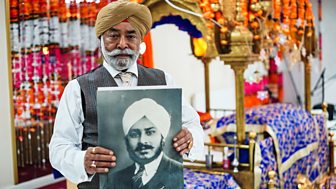
Series 1: 2. The Asturias
Dr Yasmin Khan explores an extraordinary collection of ships' passenger lists to trace the changing story of migration from the Indian subcontinent to Britain over three key decades.\n\nYasmin returns to the passenger lists held at the National Archives to unearth the stories of those travelling on another ship, the Asturias, in the late 1940s. As this was one of the first ships to sail from Bombay following independence and Partition in 1947, Yasmin is keen to discover the role these seismic events played in the passengers' decision to travel to Britain, and to find out how their lives unfolded once they got here. Yasmin's search takes her from the factories of Ellesmere Port, to exploring the privileged lifestyle enjoyed by some Anglo-Indians in Delhi before independence. Yasmin meets Sikh entrepreneurs in Leeds and uncovers the story of Britain's forgotten displaced persons camps where new migrants from the subcontinent were housed alongside the victims of the Blitz.\n\nYasmin meets Anne Tilley, who was three years old when she boarded the Asturias with her family. As an Anglo-Indian family, those who could trace a European descendant through the male line, the Scotts had led a privileged life in Delhi. But the events of 1947 led many Anglo-Indians to question their future and thousands travelled to Britain in the decade following independence. Yasmin discovers how the Scotts' initial optimism was short-lived as the realities of life in Britain, a country they had always viewed through rose-tinted spectacles, began to hit home.\n\nYasmin traces the story of the Arathoons, working-class Anglo-Indians who served in the army during both world wars and found themselves facing an uncertain future as the British army began to demobilise. They boarded the Asturias to begin a new life in Ellesmere Port, and like the Scotts, discovered that life in Britain would not always be easy - facing discrimination and sometimes violence from those they worked alongside.\n\nTehal Singh's son and grandson tell the extraordinary story of the pioneering Sikh pedlars in Britain and the reception they got from the British as they went knocking from door to door across the country. And the Rubchevska sisters reveal the real reason why hundreds of Polish families were on the Asturias and the incredible journey that had led them to their refugee camp in India. Emotional stories of loss, bravery and resilience that give a new insight into the forgotten Anglo-Indian community and the aftershocks of independence and Partition that led so many passengers to come to start new lives in Britain.
Source: BBC 2
Most recent episodes of A Passage to Britain
A Passage To Britain
Series 1: 3. The Batory
Dr Yasmin Khan explores an extraordinary collection of ships' passenger lists to trace the changing story of migration from the Indian subcontinent to Britain over three key dec ...
19-09-2018
BBC 2
A Passage To Britain
Series 1: 2. The Asturias
Dr Yasmin Khan explores an extraordinary collection of ships' passenger lists to trace the changing story of migration from the Indian subcontinent to Britain over three key dec ...
21-08-2018
BBC 2
A Passage To Britain
Series 1: 1. The Viceroy Of India
Dr Yasmin Khan explores an extraordinary collection of ships' passenger lists to trace the changing story of migration from the Indian subcontinent to Britain over three key dec ...
18-08-2018
BBC 2
Most popular episodes of A Passage to Britain
A Passage To Britain
Series 1: 2. The Asturias
Dr Yasmin Khan explores an extraordinary collection of ships' passenger lists to trace the changing story of migration from the Indian subcontinent to Britain over three key dec ...
21-08-2018
BBC 2
A Passage To Britain
Series 1: 1. The Viceroy Of India
Dr Yasmin Khan explores an extraordinary collection of ships' passenger lists to trace the changing story of migration from the Indian subcontinent to Britain over three key dec ...
18-08-2018
BBC 2
A Passage To Britain
Series 1: 3. The Batory
Dr Yasmin Khan explores an extraordinary collection of ships' passenger lists to trace the changing story of migration from the Indian subcontinent to Britain over three key dec ...
19-09-2018
BBC 2


